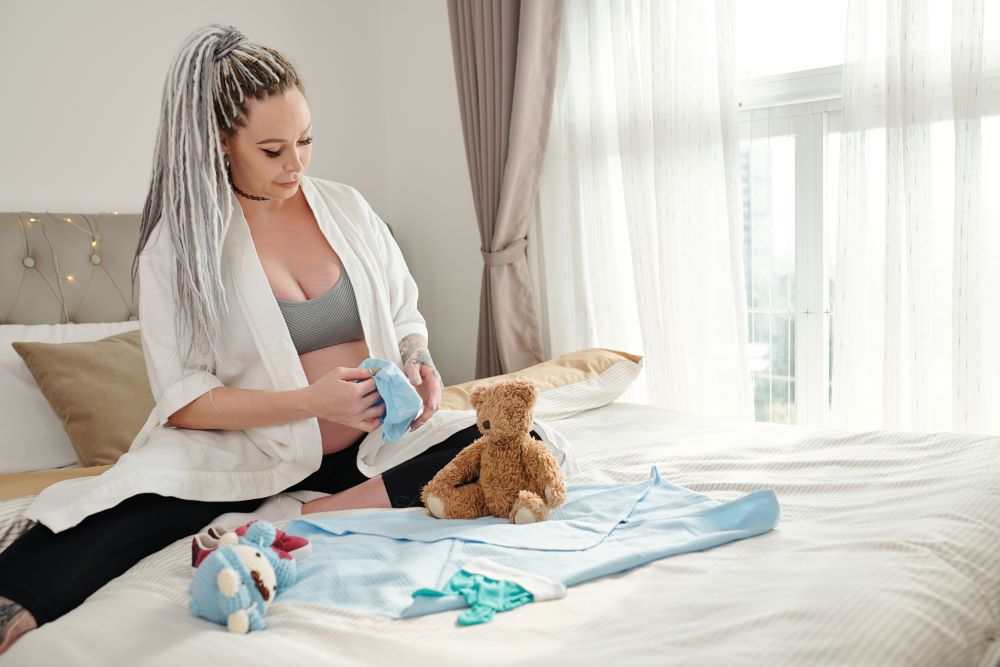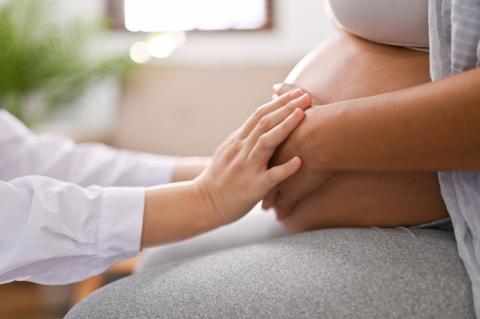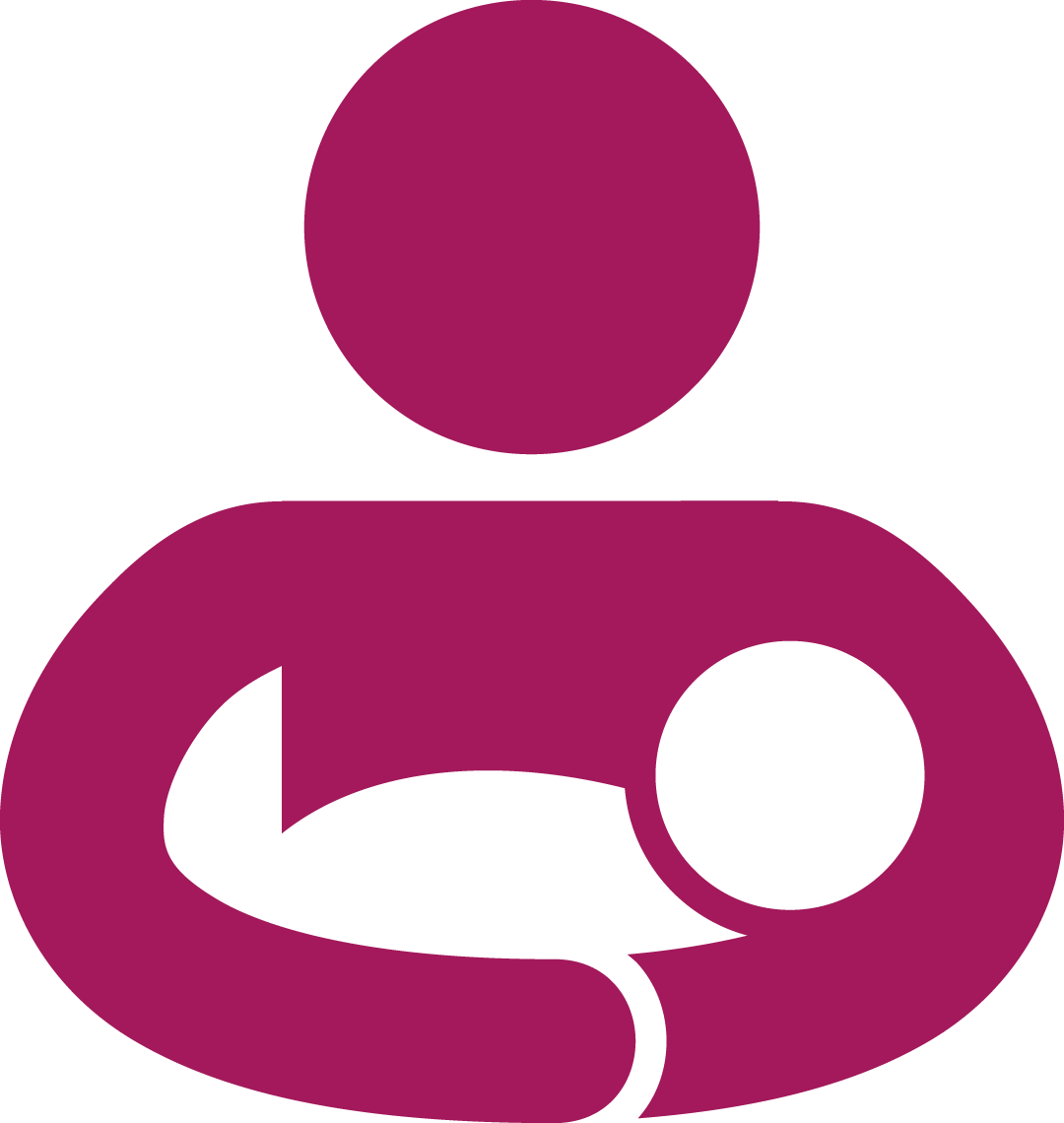The third trimester begins in week 28 and lasts until you give birth, which may be around week 40 of your pregnancy. Your baby still has plenty of growing to do – but you’re nearly there! If you can, use these last weeks to get ready for the baby’s arrival and enjoy some time for yourself. You might start to feel you’re slowing down a little now, so take any offers of help you can get and put yourself first. Not always easy, we know.
We’ve got some quick tips to help you through your third trimester, and to help you feel confident and ready for the big day – from planning for the birth, to preparing tasty meals to pop in the freezer.
Top tips from parents-to-be
Tip #1: Erin's advice for getting comfy at night
By Erin, Mum of 1
Erin shares her tips for getting a comfy night’s sleep whilst pregnant.
Tip #2: Fill up the freezer
You’ll find that once your wee one arrives it can be difficult to fit in time to cook and prepare food for yourself. If you have a freezer at home, you could try batch cooking and freeze some cooked meals now, so you have them for the first few weeks after the baby is home. Preparation in advance can be a lifesaver for hungry new mums and dads.
Tip #3: Talk to your partner about your birth plan
Take the time to really talk through your plans for the birth with your birthing partner well before your due date. Whether it's driving you to hospital, or holding your hand during contractions, it's better to talk about it in advance. That way, they’ll know what you want and can do all the talking when you’re in labour. It can take a load off your mind to know that your partner can help you communicate your needs and wants.
Tip #4: Kelly's advice on using a pregnancy pillow
By Kelly, Mum of 1
Kelly talks to us about using a pregnancy pillow to sleep.
Tip #5: Save important phone numbers
Pop all the important numbers in your phone now, including your local hospital, GP and midwife, so you can get hold of people when the time comes.
Tip #6: It’s not too late to get your immunisations
The best way to protect yourself and your baby from serious disease and illness is to get the recommended vaccines at the right time. NHS Scotland recommends that pregnant women should have the whooping cough, RSV and flu vaccines. The flu vaccine is offered from September to March and can be given at any stage during pregnancy. Whooping cough is recommended from week 16 and RSV from week 28. So if you’ve not already had your jags, ask you midwife for more information on how to get your vaccines.
You can find out more about the immunisations offered during pregnancy and why they’re so important on the NHS Inform website.
Tip #7: Be prepared
It’s not unusual for a baby to arrive early. Or late. They tend to have their own ideas about things. It’s a good idea to try and have your bag packed a few weeks before your due date, just in case.
Twins, triplets or more are more likely to arrive early than single babies, so it’s best to be ready well in advance. Our page on common labour and birth questions has a list of things you may like to pack.
Tip #8: For the office
If you’re still working and need to sit a lot, getting comfy can be tricky – especially as your baby bump gets bigger. Remember to get up every couple of hours and move around. The closer you get to the birth, try not to do too much around the house if you can help it, and get as much rest as you can.
Tip #9: Talk to your partner about how they can support you
In this film, mum Kat’s top tip is to talk to your partner before baby comes along about what they can do to support you.
Tip #10: Think about how you will feed your wee one
Before your baby arrives it’s a good idea to have a think about your feeding options and what feels right for you, whether that’s breastfeeding, bottle feeding or a mix of both. Our page on feeding options has more advice.
If you’re thinking of breastfeeding, it’s worth taking a look at what breastfeeding support is available in your area before your baby comes along, as mum Kat advises in this film.
Tip #11: Don’t ignore any letters about cervical screening
We know you’ve got a lot on your plate at the moment, but if you an invite for cervical screening (a smear test) don’t ignore it – get in touch with your GP and ask whether or not you need to attend.
You can find out more about cervical screening on the NHS Inform website.
Tip #12: Think about how you’ll cope when your baby starts crying
You might not want to think about it just now, but babies cry, and it’s a good idea to have a plan in place for how you’ll cope. Babies cry for lots of reasons, and we have lots of tips for soothing them.
But sometimes they just cry because they want to, and nothing you can do will settle them. This is perfectly normal, but it can be hard to deal with. So why not have a think about things you could do to calm yourself down if this happens? You could write them down, so you can refer to them later. For example:
- Who can I go to for help with crying?
- What will I do if I need a few minutes to myself?
- What makes me feel better?
- What makes me feel calm?
Our page on mental health advice for parents has tips you can try for keeping calm.
You can even download a free ‘crying plan’ from the ICON website to help you work out what you’ll do.
What the professionals say
"Be kind to yourself and look after yourself and if there is something you want to do use the people around you to support you and help you achieve that."
More information
For more information on going into labour and giving birth, speak to your midwife. There’s also a lot of useful information at Ready Steady Baby.
 Activities & Play
Activities & Play Behaviour
Behaviour Childcare
Childcare Development & Growing Up
Development & Growing Up Family, Friends & Relationships
Family, Friends & Relationships Feeding Your Baby
Feeding Your Baby Food & Eating
Food & Eating Health & Safety
Health & Safety Mental Health & Wellbeing
Mental Health & Wellbeing Money & Work
Money & Work Online Behaviour & Safety
Online Behaviour & Safety Pregnancy & First Days
Pregnancy & First Days School & Education
School & Education Sleep
Sleep










 Feeding Your Baby
Feeding Your Baby
 Sleep
Sleep